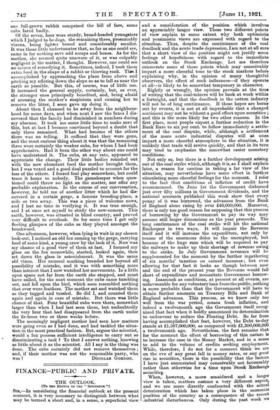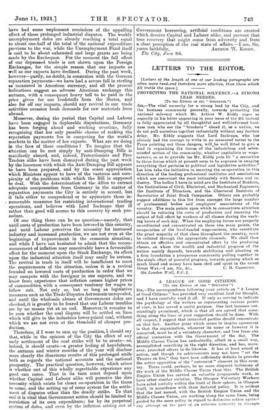FINANCE—PUBLIC AND PRIVATE.
THE OUTLOOK. (To THE EDITOR 01 THE " SPECTATOE."] Sis, In considering the financial outlook at the present moment, it is very necessary to distinguish between what may be termed a short and, in a sense, a superficial view and a consideration of the position which involves an appreciably longer view. These two different points of view explain to some extent why both optimistic and pessimistic views are expressed with regard to the situation. Thus, despite the continuance of the coal deadlock and the acute trade depression, Jam not at all sure that a short view of the position might not justify some feelings of hopefulness with regard to the immediate outlook on the Stock Exchange. Let me therefore enumerate some of these points which may conceivably impart a more cheerful tone to -the stock markets before explaining why, in the opinion of many thoughtful observers, the effect of such influences—if they operate at all—is likely to be somewhat temporary in character.
Rightly or wrongly, the opinion prevails at the time of writing that the coal-miners will be back at work within a fortnight, and that the deadlock in the cotton industry will not be of long continuance. If these hopes are borne out by events, it is not at all improbable that a changed sentiment may not be without a good effect upon securities ; and this is the more likely for two other reasons. In the first place, most people expect ,a further reduction in the Bank Rate to six per cent. to follow immediately a settle- ment of the coal dispute, while, although a settlement of the more acute industrial disputes will at once impart a more cheerful atmosphere to the situation, it is unlikely that trade will revive quickly, and that in its turn may tend to emphasize the somewhat easier monetary conditions.
Not only so, but there is a further development arising out of the coal strike which, although it is, as I shall explain later, a reason for caution in taking a far view of the situation, may nevertheless have some effect in further stimulating more cheerful feelings for the moment. I refer to the fact that conditions of inflation of credit have recommenced. On June let the Government disbursed just over fifty millions in Government dividends, and the national accounts published this week show that every penny of it was borrowed, the advances from the Bank of England alone rising by over £40,000,000. Moreover, there is only too good reason for supposing that this process of borrowing by the Government to pay its way may assume still larger dimensions as the year proceeds. The long continuance of the coal strike will hit the national Exchequer in two ways. It will impair the Revenue itself and it will increase the expenditure, not only •by reason of the enormous doles to the unemployed, but because of -the huge sum which will be required to pay the railways to make up their shortage of revenue •owing to the strike. In July Government revenues will be supplemented for the moment by the further ingathering of six months' taxation on earned incomes ; but even allowing for that fact it looks as though between now and the end of the present year the Revenue would fall short of expenditure and necessitate Government borrow- ing. Inasmuch as conditions, at present at all events, are unfavourable for any voluntary loan from the public, nothing is more probable than that the Government will have to obtain further amounts on Treasury Bills and Bank of England advances. This process, as we know only too well from the war period, means fresh inflation, and indeed a twelvemonth ago the Government itself recog- nized that fact when it boldly announced its determination to endeavour to reduce the Floating Debt. So far from having accomplished that feat, however, the Debt to-day stands at £1,367,000,000, as compared with £1,306,000,000 a twelvemonth ago. Nevertheless, the fact remains that for the moment the effect of borrowing of this nature is to increase the ease .in the Money Market, and in a sense to add to the volume of credits seeking employment. While, therefore, I do not for a moment think we are on the eve of any great fall in money rates, or .any great rise in securities, there is the possibility that the factors I have just enumerated may conceivably act favourably rather than otherwise for a time upon Stook Exchange securities. When, however, .a more considered and a longer view is taken, matters assume a very different aspect; and we are more directly confronted with the actual deterioration which has taken place in the economic position of the country as a consequence of the recent -ndustrial disturbances. Only during the past week we have had some unpleasant reminders of the appalling effect of these prolonged industrial disputes. The weekly unemployment doles are already reaching a total equal to about one-half of the total of the national expenditure previous to the war, while the Unemployment Fund itself Is said to be about exhausted and large grants are being made by the Exchequer. For the moment the full effect of our depressed trade is not shown upon the Foreign Exchanges, for the simple reason that our imports as well as our exports have declined. During the past week, however—partly, no doubt, in connexion with the German reparation payments—we have had a severe fall in sterling as measured in American currency, and all the present indications suggest an adverse American exchange this autumn, with a consequent heavy toll to be paid in the price given for our foodstuffs from the States, and also for all our imports, should any revival in our trade activities occasion fresh demands for raw materials from abroad.
Moreover, during the period that Capital and Labour have been engaged in deplorable disputations, Germany has been forging ahead and working overtime, fully recognizing that her only possible, chance of making the reparation payments lies in competing for the world's markets in the .matter of her exports. What are we doing in the face of these conditions ? To imagine that the situation can be met simply by anti-Dumping Bills is manifestly absurd, and, indeed, Protectionists and Free Traders alike have been dismayed during the past week by the looseness with which the Anti-Dumping Bill appears to have been prepared, and by the scant appreciation which Ministers appear to have of the vastness and com- plexity of the problems with which the Bill is supposed to deal. With the determination. of the Allies to extract adequate compensation from Germany- in- the matter of reparation payments the City is entirely in accord, but it fails either to comprehend or to appreciate these in- numerable measures for restricting international trading operations, and believes with Lord Inchcape that ill rather than good will accrue to this country by such pro- cedure.
Of one thing there can be no questiom—namely, that until costs of production have been lowered in this country, and until Labour perceives the necessity for increased industry and increased production, we are not even at the beginnings of improvement in the economic situation; and while I have-not hesitated to admit that the recom- mencement of inflation may conceivably have a favourable effect for the moment upon the Stock Exchange, its effect upon the industrial situation itself may easily be serious. The revival in trade in itself will be insufficient to meet the requirements of the situation, unless it is a revival founded on lowered costs of production in order that we may compete with the foreigner in our exports, and we know from experience that inflation causes higher prices of commodities-, with a consequent tendency for wages to follow suit. Not only so, but so long as legislative measures such as the Trade Disputes Aotiemain unrepealed; and until the wholesale abuses of Government doles are checked, it is greatly to be feared that our Labour troubles are by no means yet at an end. Moreover,-it remains to be seen whether the coal dispute will be settled on lines which will give to the industries lower-priced coal, without which we are not even at the threshold of cheaper pro- duction.
Therefore, if I were to sum up the position, I should say that, while in the opinion of the City the effict of any early settlement of the coal strike will be to create—as, indeed, it should create—a greater feeling of hopefulness, the autumn and winter months of the year will disclose more clearly the disastrous results of this prolonged strife both as regards the national accounts and the national prosperity. The practical question, however, which arises is whether out of this wholly regrettable experience any good can come. That in its turn must depend upon whether Capital and Labour alike will perceive the dire necessity .which exists for closer co-operation in the times to come, and the setting up of some system for the settle- ment of disputes other than the deadly strike. To that end' it is vital that Government action should be limited to restriction of its own expenditure; for by its perpetual system of doles, and even by the inflation arising out of Government borrowing, artificial conditions are created which deceive Capital and Labour alike, and prevent that true recovery that might come from adversity and from a clear perception of the real state of affairs.—I am, Sir,



































 Previous page
Previous page